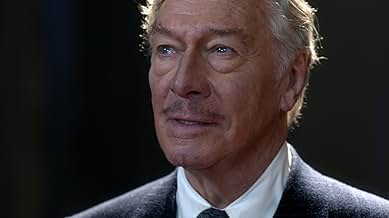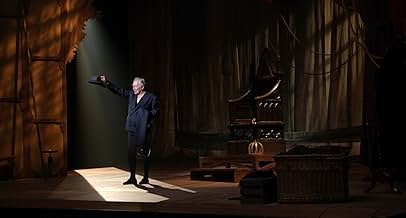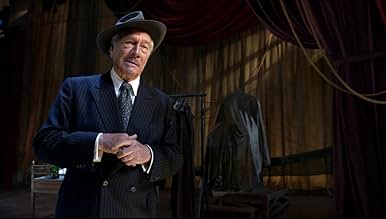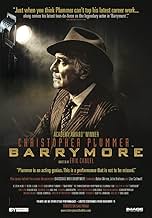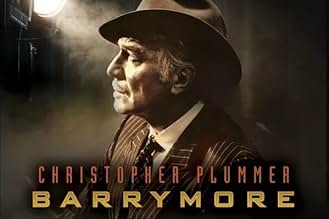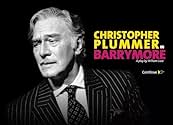As John Barrymore reckons with the ravages of his life of excess, he rents an old theatre to rehearse for a backer's audition to raise money for a revival of his 1920 Broadway triumph in Ric... Read allAs John Barrymore reckons with the ravages of his life of excess, he rents an old theatre to rehearse for a backer's audition to raise money for a revival of his 1920 Broadway triumph in Richard III.As John Barrymore reckons with the ravages of his life of excess, he rents an old theatre to rehearse for a backer's audition to raise money for a revival of his 1920 Broadway triumph in Richard III.
- Director
- Writers
- Stars
- Awards
- 2 wins total
- Director
- Writers
- All cast & crew
- Production, box office & more at IMDbPro
7.2418
1
2
3
4
5
6
7
8
9
10
Featured reviews
Christopher Plummer is God but this movie is a Dud
It is 1942. Barrymore prepares for a backer's audition as he dreams of a triumphant comeback. This is Christopher Plummer reprising his one man play as the alcoholic John Barrymore. There is no doubt that Plummer is an acting God. He shows it here in spades. But it doesn't add up to be a compelling movie.
It's one of those age old question of how to adapt a play onto the big screen. This felt like a slightly drunk old grandfather telling the young'uns about the old times. Sometimes it's funny as Barrymore and CW Fields try to sign up for WWI. But it's mostly a series of never ending stories. He is alone with Frank who is just off stage. It doesn't really allow for great interaction. We don't get the full power of Plummer's presence that I assume we would get from the play. For Plummer as an actor, I would give him a 10. But as a movie, this is only a 5.
It's one of those age old question of how to adapt a play onto the big screen. This felt like a slightly drunk old grandfather telling the young'uns about the old times. Sometimes it's funny as Barrymore and CW Fields try to sign up for WWI. But it's mostly a series of never ending stories. He is alone with Frank who is just off stage. It doesn't really allow for great interaction. We don't get the full power of Plummer's presence that I assume we would get from the play. For Plummer as an actor, I would give him a 10. But as a movie, this is only a 5.
Christopher Plummer is brilliant
Christopher Plummer is "Barrymore" in this 2014 filming of the two-person play by William Luce, which was first performed by Plummer in 1996.
In the play, Barrymore has rented a theater in order to rehearse for a backers audition of a Richard III revival. The play had been one of his great triumphs in the theater. He can't remember his lines and is drunk, so he needs the rehearsal. Offstage is a prompter, Frank (John Plumpis) who feeds him lines and puts up with the erratic actor throughout.
During rehearsal, Barrymore confronts his growing up, his marriages, his brother and sister, his friends, his successes and his failures, every once in a while coming out with something that's actually from Richard III, with some other Shakespeare thrown in.
Christopher Plummer is phenomenal. He sounds just like Barrymore, and he is superb at bringing out the humor and pathos of the script, as well as reciting some of the beautiful Shakespearian speeches.
I realize some people didn't care for this, and probably seeing this on stage is a different experience. One poster mentioned that this is "dated material and a subject long forgotten." The name Barrymore is not forgotten, and there's nothing dated about Shakespeare. John Barrymore was a fascinating person, an important part of theater, and a presence in films. And Christopher Plummer is a treasure.
In the play, Barrymore has rented a theater in order to rehearse for a backers audition of a Richard III revival. The play had been one of his great triumphs in the theater. He can't remember his lines and is drunk, so he needs the rehearsal. Offstage is a prompter, Frank (John Plumpis) who feeds him lines and puts up with the erratic actor throughout.
During rehearsal, Barrymore confronts his growing up, his marriages, his brother and sister, his friends, his successes and his failures, every once in a while coming out with something that's actually from Richard III, with some other Shakespeare thrown in.
Christopher Plummer is phenomenal. He sounds just like Barrymore, and he is superb at bringing out the humor and pathos of the script, as well as reciting some of the beautiful Shakespearian speeches.
I realize some people didn't care for this, and probably seeing this on stage is a different experience. One poster mentioned that this is "dated material and a subject long forgotten." The name Barrymore is not forgotten, and there's nothing dated about Shakespeare. John Barrymore was a fascinating person, an important part of theater, and a presence in films. And Christopher Plummer is a treasure.
Extremely good film, brilliant performance by Plummer
Christopher Plummer plays John Barrymore, the legendary silent film actor who transitioned into talkie movies in the 1920s & 1930s and starred in legendary films like Grand Hotel & along with Charlie Chaplin was considered by some film historians as the most talented actor in Hollywood during that time period, and of course he is Drew Barrymore's Grandfather. It takes place in 1942, right before John Barrymore died. It is an extremely good movie, I give it 7 of 10 stars, but Christopher Plummer's performance is a Masterpiece and I give his performance 10 of 10 stars. I would recommend this film as it is extremely good, but if you want to see the brilliant acting of Christopher Plummer it's a must see!
Not for everyone, but great for others.
Christopher Plummer, what a great actor, he is known mainly to the world as Capt. Von Trapp in the Sound of music. It seems as though he has heightened his acting skills on film since he has reached his early eighties, with a 2011 Oscar for Beginnings and his touching role in Millennium, among others. This filmed One man show gives him the opportunity to show us the scope of his titanesque talent. His subject: John Barrymore, from a family dynasty (his parents, his brother Lionel and his sister Ethel) that marked the classical theatre and cinema of the late 19th century through to today, with grand- daughter Drew. Plummer takes us along the route this person who tasted inaccessible glories and a proportionate decline. This is theatre on film. Definitely not for everyone. Excellent on the other hand, for those who have some knowledge of classical Shakespearian theatre and the golden age of American cinema.
Powerful One Man Show
As John Barrymore (Christopher Plummer) reckons with the ravages of his life of excess, he rents an old theater to rehearse for a backer's audition to raise money for a revival of his 1920 Broadway triumph in Richard III.
I am not as familiar with Plummer's work as I should be, or the work of John Barrymore for that matter. But this (almost) one-man show with dirty jokes and running commentary is great. Few films feature just one person (the only other jumping to mind right now is Robert Altman's film on Nixon), but sometimes these are the most powerful, letting the actor test their range.
More people should see this... and I should make a point to see more of Plummer and Barrymore's work.
I am not as familiar with Plummer's work as I should be, or the work of John Barrymore for that matter. But this (almost) one-man show with dirty jokes and running commentary is great. Few films feature just one person (the only other jumping to mind right now is Robert Altman's film on Nixon), but sometimes these are the most powerful, letting the actor test their range.
More people should see this... and I should make a point to see more of Plummer and Barrymore's work.
Did you know
- TriviaA scene from John Barrymore's production of Richard III was included in the early talkie Show of Shows (1929).
- Quotes
John Barrymore: Like they say, a man isn't old til regrets take the place of dreams
- ConnectionsReferences Mighty Joe Young (1949)
- SoundtracksMaestro
Composed by Craig Braginsky
Performed by Craig Wilde (Braginsky)
EU Edition only Courtesy BMP Records
Details
Box office
- Budget
- CA$3,000,000 (estimated)
- Gross worldwide
- $59,495
- Runtime
- 1h 23m(83 min)
Contribute to this page
Suggest an edit or add missing content


